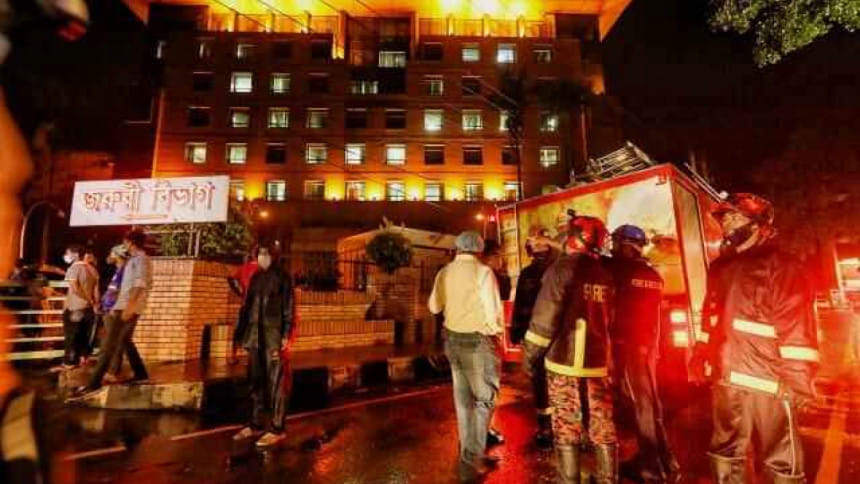Holding companies liable for death by negligence

On May 27, 2020, a devastating fire broke out in the corona isolation unit of United Hospital in Gulshan, which claimed the lives of five patients who were receiving treatment there. On June 6, 2020, the five member committee established by the Fire Service and Civil Defence (FSCD) to investigate the incident reported that they found evidence of "negligence and indifference of United Hospital". Since their report is yet to be made public, we may turn to the evidence of negligence found in prior inspections by the Dhaka North City Corporation mayor and FSCD, as announced in press briefings.
Firstly, the corona isolation unit was a makeshift structure, detached from the main building and made of extremely flammable materials, such as Partex boards, while the presence of disinfectants inside the unit added to the risk of flammability. Secondly, the corona isolation unit did not have any fire exits, fire hydrants or fire extinguishers and was built without obtaining a fire safety clearance from the FSCD. Therefore, the unit was "built in violation of the [National] Building Code", as stated by Debashis Bardhan, deputy director of FSCD, Dhaka Division.
Thirdly, eight out of the eleven fire extinguishers that were available in the main building were expired, while the hospital's fire safety officer was not on duty when the fire broke out. The fourth piece of evidence—the fire service mentioned that they only came to know about the fire at 9:55 PM, 25 minutes after the fire broke out, although the hospital authorities maintained that they had placed the call much earlier.
Finally, two out of the five patients killed in the fire had actually tested negative for Covid-19, but were still being kept in the corona isolation unit despite repeated requests by family members for their transfer. These findings naturally led to widespread discussion on social media about the lack of accountability for corporate negligence in our country. The questions therefore arise—can companies be held to account for causing death by negligence, and how? There are at least three ways this can be done: by filing a criminal case, a writ petition and a tort case.
Under section 304A of the Penal Code 1860, causing death by negligence is punishable by a maximum of five years or with fine or both. While criminal cases are sometimes filed against CEOs or MDs of companies or entities, they often do not get justice. This is because proving that death occurred as a consequence of corporate negligence is extremely difficult to establish in criminal law, due to the higher burden of proof and its general focus on intentional wrongdoing. Even if fines are imposed on the company, this money would not go to the victims' families unless the court converted the fine to an award compensation (which seldom happens). Additionally, since fines are punitive in nature, the amount could never be considered as adequate compensation, even when converted.
The constitution guarantees certain fundamental rights (such as right to life) for all people within the territory of Bangladesh, and relief can be sought by petitioning the Supreme Court when any of these rights are breached, in the form of writ petitions. Previously, such petitions were only filed against public bodies but more recently, private bodies, such as private companies, are also being impleaded. If the Supreme Court is satisfied that there has indeed been a violation of fundamental rights, it can issue any "order or directions" against "any person" as it deems "appropriate", including an order of compensation to be paid to a private party.
In some recent high profile negligence cases, the Supreme Court has exhibited willingness to award compensation quite speedily (such as the road crash cases of Rajib, Jabal E Noor and Greenline, along with the earlier death of four year old boy Zihad). However, there are also other cases where the compensation has not been received despite writs being filed seeking it (such as the Chawkbazar fire case and FR Tower case). Crucially, the Appellate Division of the Supreme Court in Bangladesh vs Nurul Amin made it clear that compensation for violation of fundamental rights through writ petitions will be an exceptional remedy. This is because generally, tort law is considered to be the appropriate forum for filing compensation cases.
The less explored option is a tort case. Tort law is the specific branch of law designed to deal with compensating harms suffered by individuals due to the actions of others. In Bangladesh, while tort cases remain quite rare, the Fatal Accidents Act 1855 (FAA) would allow family members of anyone who has died due to a company's negligence to claim compensation, and such compensation will be assessed at a much higher scale than in writs and criminal cases. In tort law (and therefore FAA), as soon as negligence is proved (and no valid defences are applicable), the court would be bound to award compensation to the victims as a matter of right, which is not the case in writs or criminal cases. Furthermore, in contrast to criminal law, the burden of proof is much lower in tort law and employers can be held vicariously liable for the negligence of their employees. Together, these two differences mean that it would be more possible to prove corporate negligence in tort cases than in criminal cases.
So while there are at least three different ways in which victims' families can hold companies to account for causing death by negligence, the third and most advantageous option tends to remain unexplored in our country. It must be remembered that the law does not require victims' families to choose only one out of the three options as they have the right to bring all three forms of legal action simultaneously.
Taqbir Huda is a Research Specialist at Bangladesh Legal Aid and Services Trust (BLAST) and coordinates the Tort Law Project Bangladesh.
Email: [email protected]

 For all latest news, follow The Daily Star's Google News channel.
For all latest news, follow The Daily Star's Google News channel. 



Comments